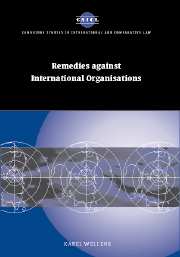Book contents
- Frontmatter
- Contents
- Acknowledgements
- List of abbreviations
- Introduction
- Part I General features of remedies against international organisations
- Part II Procedural aspects of remedial action against international organisations
- Part III Substantive outcome of remedial action against international organisations
- 13 General features of remedial outcome
- 14 Remedial outcome for staff members
- 15 Remedial outcome for private claimants
- Part IV Alternative remedial action against international organisations and options for the future
- Conclusion
- Bibliography
- Index
- CAMBRIDGE STUDIES IN INTERNATIONAL AND COMPARATIVE LAW
15 - Remedial outcome for private claimants
Published online by Cambridge University Press: 13 July 2009
- Frontmatter
- Contents
- Acknowledgements
- List of abbreviations
- Introduction
- Part I General features of remedies against international organisations
- Part II Procedural aspects of remedial action against international organisations
- Part III Substantive outcome of remedial action against international organisations
- 13 General features of remedial outcome
- 14 Remedial outcome for staff members
- 15 Remedial outcome for private claimants
- Part IV Alternative remedial action against international organisations and options for the future
- Conclusion
- Bibliography
- Index
- CAMBRIDGE STUDIES IN INTERNATIONAL AND COMPARATIVE LAW
Summary
Contractual liability claims
The substantive outcome of remedial action based on a contractual liability claim is decisively determined by the UN applying its own internal law to its contractual activity, in most cases to the exclusion of any domestic law. Non-compliance with the terms of a contract between an international organisation and a private party may result in either party unilaterally invoking the resiliation clause and eventually applying for judicial enforcement, provided access to such a forum has been granted.
In most instances, problems arising under commercial agreements are resolved by means of direct negotiations between the parties. Claims are reviewed ‘on the basis of the contract terms, which we interpret in light of the proper law of the contract, the internal legal rules of the organisation where these have been referred to expressly or by implication in the contract and by application of the general principles of law and commercial practice and usage applicable to the transaction’. As to arbitration, given the almost total absence of reference by the contracting parties to a particular law, and in accordance with Article 33 of the UNCITRAL Rules, the Arbitral Tribunal applies the law determined by the conflict of laws rules, which eventually leads to the application of the lex mercatoria and general principles of law, while still having due regard to the terms of the contract and the usages of the trade applicable to the transaction.
- Type
- Chapter
- Information
- Remedies against International Organisations , pp. 156 - 166Publisher: Cambridge University PressPrint publication year: 2002

